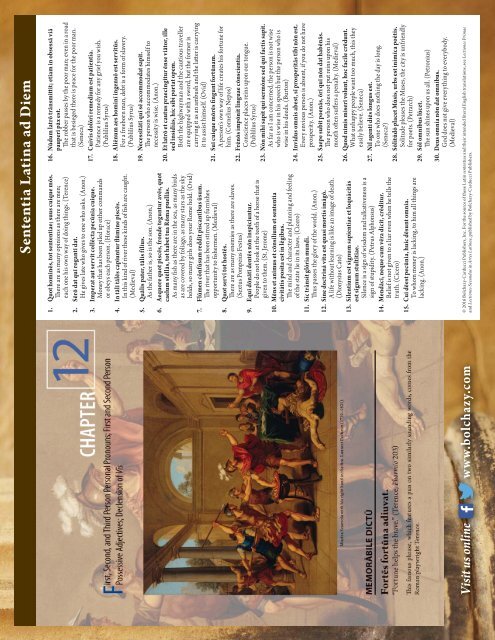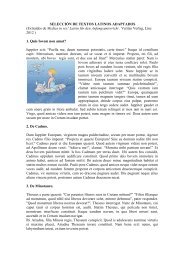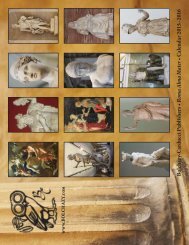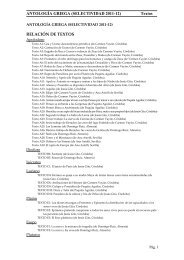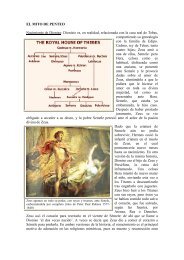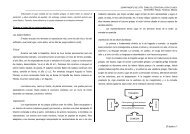www.BOLCHAZY.com
2016-2017RomanCalendar
2016-2017RomanCalendar
You also want an ePaper? Increase the reach of your titles
YUMPU automatically turns print PDFs into web optimized ePapers that Google loves.
Visit us online<br />
<strong>www</strong>.bolchazy.<strong>com</strong><br />
Sententia Latina ad Diem<br />
1. Quot hominēs, tot sententiae; suus cuique mōs.<br />
There are as many opinions as there are men;<br />
each one his own way of doing things. (Terence)<br />
2. Sērō dat quī rogantī dat.<br />
He gives late who gives to one who asks. (Anon.)<br />
3. Imperat aut servit collēcta pecūnia cuique.<br />
Money that has been piled up either <strong>com</strong>mands<br />
or obeys each person. (Horace)<br />
4. In tālī tālēs capiuntur flūmine piscēs.<br />
In this kind of river these kinds of fish are caught.<br />
(Medieval)<br />
5. Quālis pater, tālis fīlius.<br />
As the father is, so is the son. (Anon.)<br />
6. Aequore quot piscēs, fronde teguntur avēs, quot<br />
caelum stēllās, tot habet tua Rōma puellās.<br />
As many fish as there are in the sea, as many birds<br />
as are covered by foliage, as many stars as the sky<br />
holds, so many girls does your Rome hold. (Ovid)<br />
7. Flūmen cōnfūsum reddit piscantibus ūsum.<br />
The river that has been stirred up furnishes<br />
opportunity to fishermen. (Medieval)<br />
8. Quot servī tot hostēs.<br />
There are as many enemies as there are slaves.<br />
(Sextus Pompeius Festus)<br />
9. Equī dōnātī dentēs nōn īnspiciuntur.<br />
People do not look at the teeth of a horse that is<br />
given to them. (St. Jerome)<br />
10. Mēns et animus et cōnsilium et sententia<br />
cīvitātis posita est in lēgibus.<br />
The mind and character and planning and feeling<br />
of the state lie in its laws. (Cicero)<br />
11. Sīc trānsit glōria mundī.<br />
Thus passes the glory of the world. (Anon.)<br />
12. Sine doctrīnā vīta est quasi mortis imāgō.<br />
A life without learning is like an image of death.<br />
(Dionysius Cato)<br />
13. Silentium est sīgnum sapientiae et loquācitās<br />
est sīgnum stultitiae.<br />
Silence is a sign of wisdom and talkativeness is a<br />
sign of stupidity. (Petrus Alphonsus)<br />
14. Mendācī, neque cum vēra dīcit, crēditur.<br />
Belief is not given to a liar even when he tells the<br />
truth. (Cicero)<br />
15. Cui dēest pecūnia, huic dēsunt omnia.<br />
To whom money is lacking, to him all things are<br />
lacking. (Anon.)<br />
16. Nūdum latrō trānsmittit; etiam in obsessā viā<br />
pauperī pāx est.<br />
The robber passes by the poor man; even in a road<br />
that is besieged there is peace for the poor man.<br />
(Seneca)<br />
17. Cuivīs dolōrī remedium est patientia.<br />
Patience is a remedy for any grief you wish.<br />
(Publilius Syrus)<br />
18. Aliēnum aes hominī ingenuō est servitūs.<br />
For a freeborn man, debt is a form of slavery.<br />
(Publilius Syrus)<br />
19. Necessitātī quī sē ac<strong>com</strong>modat sapit.<br />
The person who ac<strong>com</strong>modates himself to<br />
necessity is wise. (Anon.)<br />
20. Et latrō et cautus praecingitur ēnse viātor, ille<br />
sed īnsidiās, hic sibi portat opem.<br />
Both the highwayman and the cautious traveller<br />
are equipped with a sword, but the former is<br />
carrying it as an ambush and the latter is carrying<br />
it to assist himself. (Ovid)<br />
21. Suī cuique mōrēs fingunt fortūnam.<br />
A person’s own way of life creates his fortune for<br />
him. (Cornelius Nepos)<br />
22. Frēnōs impōnit linguae cōnscientia.<br />
Conscience places reins upon our tongue.<br />
(Publilius Syrus)<br />
23. Nōn mihī sapit quī sermōne sed quī factīs sapit.<br />
As far as I am concerned, the person is not wise<br />
who is wise in his speech but the person who is<br />
wise in his deeds. (Burton)<br />
24. Invidus omnis abest, sī prosperitās tibi nōn est.<br />
Every envious person is absent, if you do not have<br />
prosperity. (Anon.)<br />
25. Saepe subit poenās, ōrī quī nōn dat habēnās.<br />
The person who does not put reins upon his<br />
mouth often suffers a penalty. (Medieval)<br />
26. Quod nimis miserī volunt, hoc facile crēdunt.<br />
What unhappy people want too much, this they<br />
easily believe. (Seneca)<br />
27. Nīl agentī diēs longus est.<br />
To one who does nothing the day is long.<br />
(Seneca?)<br />
28. Sōlitūdō placet Mūsīs, urbs est inimīca poētīs.<br />
Solitude pleases the Muses, the city is unfriendly<br />
for poets. (Petrarch)<br />
29. Sōl omnibus lūcet.<br />
The sun shines upon us all. (Petronius)<br />
30. Deus omnia nōn dat omnibus.<br />
God does not give everything to everybody.<br />
(Medieval)<br />
© 2016 Bolchazy-Carducci Publishers, Inc. For the source of these Latin sententiae and their intended literal English translations, see Lectiones Primae<br />
and Lectiones Secundae in Artes Latinae, published by Bolchazy-Carducci Publishers.


